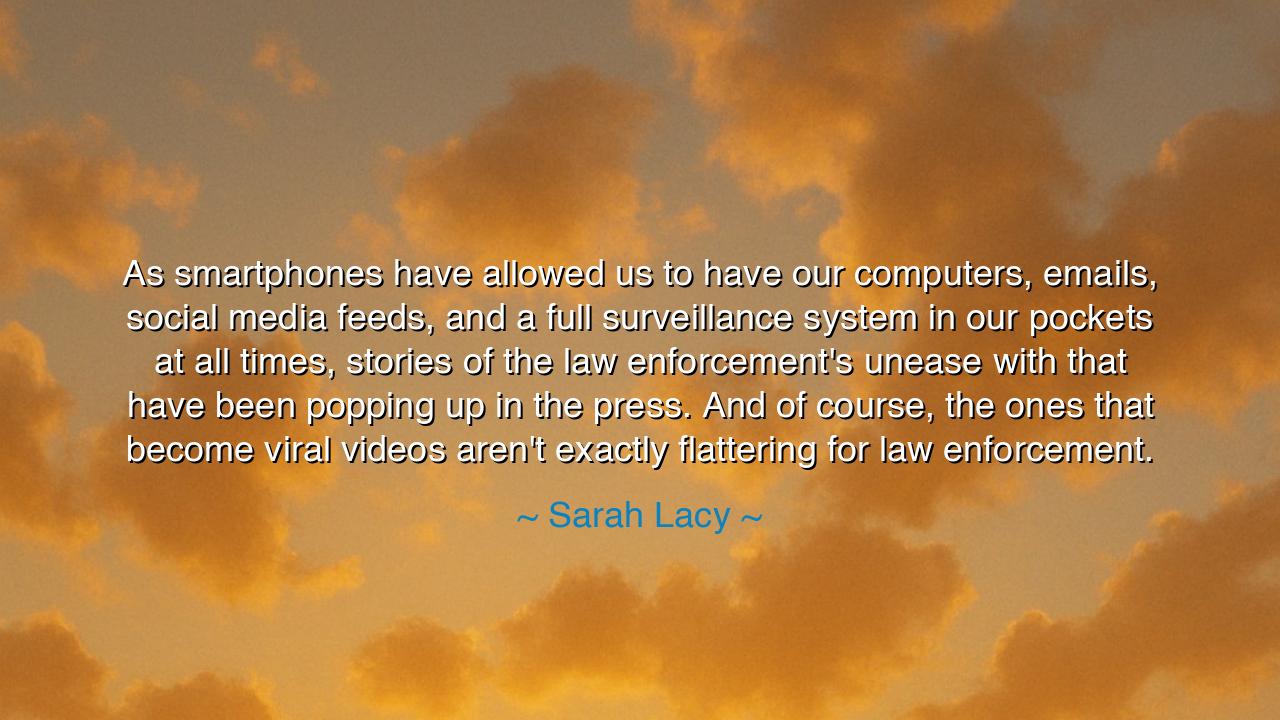
As smartphones have allowed us to have our computers, emails
As smartphones have allowed us to have our computers, emails, social media feeds, and a full surveillance system in our pockets at all times, stories of the law enforcement's unease with that have been popping up in the press. And of course, the ones that become viral videos aren't exactly flattering for law enforcement.






“As smartphones have allowed us to have our computers, emails, social media feeds, and a full surveillance system in our pockets at all times, stories of the law enforcement's unease with that have been popping up in the press. And of course, the ones that become viral videos aren't exactly flattering for law enforcement.” — Sarah Lacy
Hear now the words of Sarah Lacy, a chronicler of our digital age, whose observation pierces to the heart of a new and uneasy truth. In her saying, she does not marvel at the power of smartphones as a mere technological triumph—she reveals their deeper significance as instruments of witness and accountability. These small devices, glowing in our hands, have become not only tools of communication but the mirrors of power itself. They carry within them the eyes of the world, the memory of moments that might once have vanished into silence. Yet, as Lacy warns, such visibility stirs discomfort among those who once operated in the shadows, where authority moved unseen.
In ancient times, scribes wrote on tablets of clay; heralds carried proclamations by foot. Truth was slow to travel, and injustice often hid behind the veil of distance. But now, in this new epoch, the smartphone has become the modern tablet of truth—instant, eternal, and inescapable. With it, the common citizen wields the power once reserved for the chroniclers of kings. Every gesture, every word, every act of force or mercy can be captured and shared before the echo of it fades. Lacy’s words remind us that this transformation is not neutral—it has unbalanced the old hierarchies, exposing deeds once unseen, giving voice to the voiceless and scrutiny to the powerful.
The unease of law enforcement, as she observes, is not born from malice alone, but from the shock of a world that no longer forgets. Where once their word alone could shape the story, now a thousand lenses contend with their version of truth. This is not the first time in history that power has trembled before the dawn of light. When Johannes Gutenberg brought forth the printing press, rulers and priests alike feared its power to spread ideas they could not control. And yet, that same power gave rise to reformation, to knowledge, to freedom of thought. So too, in our age, the camera in the pocket serves as both revolution and reckoning—a new scripture of accountability, written not with ink but with light.
But there is a double edge to this revelation. For the surveillance system that resides in our pockets not only watches others—it watches us. In recording injustice, we also surrender fragments of our own privacy; in holding others to account, we open ourselves to being held. Thus, Lacy’s words echo a paradox that the ancients themselves might have pondered: the gift of knowledge is also a burden. The same device that exposes wrongdoing can also enslave us to visibility, tracking our habits, desires, and fears. The power of the smartphone is immense, but it demands wisdom equal to its reach.
Consider the story of the Rodney King video of 1991—a moment before the age of smartphones, yet a herald of it. A bystander, with a simple camcorder, captured the beating of a man by officers of the law. That grainy footage ignited a nation, revealing a truth that could no longer be denied. It was a glimpse of what Lacy describes—the birth of the citizen witness. Today, with millions of such witnesses carrying digital eyes, that power has multiplied a thousandfold. Yet with it comes responsibility—to seek not only exposure, but justice grounded in truth, not chaos born of spectacle.
Lacy’s insight is thus both observation and warning. The viral videos she mentions—those swift currents of outrage—are not always pure in motive or complete in story. They illuminate, yes, but they can also inflame. The challenge of our time is not only to capture the truth but to interpret it wisely. For without discernment, light itself can blind. It is not enough to record; one must also understand. The ancient philosophers taught that wisdom is not in seeing, but in seeing rightly. So too must we, children of the digital age, learn to wield the power of constant witness with humility and care.
And so, my children of the glowing world, remember this: your devices are not mere toys; they are instruments of truth and transformation. Use them not as weapons of scorn but as guardians of justice. When you record, do so with courage; when you share, do so with discernment. Do not let the chain of constant exposure rob you of compassion, nor the flood of information drown your judgment. For in this age, the line between surveillance and illumination, between tyranny and truth, is as thin as a beam of light. Walk it wisely, and you will not only live well—you will live free.






AAdministratorAdministrator
Welcome, honored guests. Please leave a comment, we will respond soon